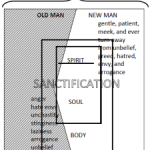 A friend on Facebook asked one of those questions that many Christians of goodwill wrestle with. Though the church body in question for him is the Roman Catholic Church, one might easily wonder the same thing about any heterodox group. Here’s his question:
A friend on Facebook asked one of those questions that many Christians of goodwill wrestle with. Though the church body in question for him is the Roman Catholic Church, one might easily wonder the same thing about any heterodox group. Here’s his question:
[A]re Roman Catholics Christians? If Justification is the chief doctrine, and they flat out deny it, are they not unbelievers? Just because they mention the name Jesus, along with Mary and the Saints, does that make them Christians? I’m uncertain on this point, for if the Pope be antichrist, what are those who follow him?
What follows here is an assortment of quotations from people whose opinions on this question I have ample cause to respect.
Starting off, here’s Dr. Luther:
The church is universal throughout the world, wherever the Gospel of God and the sacraments are present. Although the city of Rome is worse than Sodom and Gomorrah, nevertheless there remain in it Baptism, the Sacrament, the voice and text of the Gospel, the Sacred Scriptures, the ministries, the name of Christ, and the name of God. Whoever has these, has them; whoever does not have them, has no excuse, for the treasure is still there. Therefore the Church of Rome is holy, because it has the holy name of God, the Gospel, Baptism, etc. If these are present among a people, that people is called holy. Thus this Wittenberg of ours is a holy village, and we are truly holy, because we have been baptized, communed, taught, and called by God; we have the works of God among us, that is, the Word and the sacraments, and these make us holy. … [E]ven though the Galatians had been led astray, Baptism, the Word, and the name of Christ still continued among them. Besides, there were still some good men who had not defected from Paul’s doctrine and who had a proper understanding of the Word and the sacraments, which could not be defiled by those who did rebel. For Baptism, the Gospel, etc., do not become unholy because I am defiled and unholy and have a false understanding of them. On the contrary, they remain holy and exactly what they were, regardless of whether they are among the godly or the ungodly; men can neither defile them nor hallow them. By our good or evil behavior, by our good or evil life and morals, they are defiled or hallowed in the sight of the Gentiles (Rom. 2:24) but not in the sight of God. Therefore the church is holy even where the fanatics are dominant, so long as they do not deny the Word and the sacraments; if they deny these, they are no longer the church. Wherever the substance of the Word and the sacraments abides, therefore, there the holy church is present, even though Antichrist may reign there; for he takes his seat not in a stable of fiends or in a pigpen or in a congregation of unbelievers but in the highest and holiest place possible, namely, in the temple of God (2 Thess. 2:4). Thus our brief answer to this question is this: The church is universal throughout the world, wherever the Gospel of God and the sacraments are present. The Jews, the Turks, and the fanatics are not the church, because they oppose and deny these things.” (Blessed Martin Luther; Luther’s Works, AE; Vol. 26:24-26) (Emphases mine. —TDD)
When I asked my spiritual director, Fr. Charles L. McClean, about this portion of Luther’s Works, he had this to say:
In his Lectures on Galatians (AE 26:25f) Luther seems to say that, unlike the Roman Church where Antichrist has his seat, the “fanatics” have so rejected the Gospel and Sacraments that they are simply outside the Church of God. I cannot recall any passage in the Lutheran Confessions which explicitly teaches this.
On the one hand, we know with certainty where the Church is: wherever through (as much of) the Gospel and Sacraments (as somehow survive) God creates faith in human hearts when and where it pleases Him. On the other hand, we cannot know with certainty where the Church is not. And I would raise the question: Is it necessary for us to know where the Church is not? Is it not a kind of causa irrealis? And do we not in charity presume that where human beings are baptized in the name of the Holy Trinity, there the Church is being gathered?
I also cannot help but wonder if ‘unchurching’ professing Christian bodies is not in fact a kind of spiritual illness. (It reminds me very much of that other in my judgment spiritual illness when people are so eager—and even delighted!—to declare who is in fact in hell!) We obviously cannot have communicatio in sacris with heterodox churches but that is an entirely different question. It seems to me that where the Church is is God’s business not ours.
I think this question belongs to those questions which can never be answered definitely in this present world. Or so it seems to me. (Emphasis mine. —TDD)
And in another email:
There is of course the question of how confessional Lutherans should regard and relate to the Church of Rome. The attached Reformation Day sermon pretty well expresses my own heart-felt convictions. I think Dr. Sasse provides an example for us. In later life he met and carried on a correspondence with the great Jesuit biblical scholar, Augustin Cardinal Bea, who among other things was father confessor to Pope Pius XII. Of this I am convinced: we dare not look on the troubles of the Roman Church with a kind of Schadenfreude but rather with deep sympathy and compassion for fellow Christians in their difficulties and sorrows—as we would hope that our fellow Christians would look on our own! After his first meeting with Cardinal Bea, Sasse said that he and the Cardinal were of one mind in this: that we are all like the disciples in the boat on the storm-tossed sea praying “Lord, save us!” Sasse always speaks of the “tragedy” of the Roman Church. There can only be tragedy where there is in fact goodness and greatness! There can obviously be no communicatio in sacris with the Roman Church, but we can and should certainly ‘speak the truth in love’ (Eph.4:15) That means (among other things) the avoidance of language that unnecessarily wounds them, an effort to truly to understand them, and an effort to present the truth we confess in all humility and charity. And as Franz Pieper and Kurt Marquart among others have pointed out: despite any confusions in our carnal minds about matters of doctrine “all Christians believe in justification by faith.” In his volume Eschatology Cardinal Ratzinger wrote: “What actually saves is the full assent of faith” (p.231).
And then there’s this, from the sainted Rev. Dr. Kurt Marquart:
Moreover, the One Lord is indivisible; if we have Him at all, we have Him wholly and altogether. And since faith is no mere human conviction, but is in every case the work and gift of the Spirit of Truth (St. John 16:13), this same Spirit-wrought faith is exactly the same in every believer’s heart—whatever the contradictions in his fleshly mind or in the doctrine of his heterodox church! This means that every Trinitarian Font, whatever its other entanglements, offers and bestows in the One Baptism the One Lord and His One Faith – no more and no less by divine institution—if it offers the Lord’s Baptism at all. (“The Shape and Foundation of Faith”; a lecture given at Concordia Seminary, Ft. Wayne, Indiana, on Jauary 20, 1999) (Emphasis mine. —TDD)
My friend George writes quite stirringly about why we can confess this to be the case in his piece, “A Lutheran View of Mystical Ecclesiology” (his piece; my title). This isn’t his main point, but I think you’ll see how it follows from what he says.
Is a man justified by his fiducia and assensus to the doctrine of justification by faith? No, he is saved by grace through faith in Christ. Who among us has a perfect faith? No one. Who among us has a perfect Christ? All who trust in His mercy. For faith simply receives the promised mercy. He who has faith at all has all the benefits of Christ whole and entire.
+SDG+











